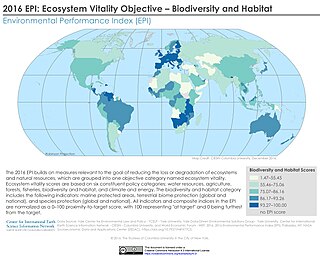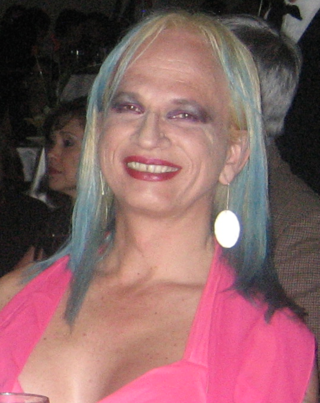Related Research Articles

Conservation biology is the study of the conservation of nature and of Earth's biodiversity with the aim of protecting species, their habitats, and ecosystems from excessive rates of extinction and the erosion of biotic interactions. It is an interdisciplinary subject drawing on natural and social sciences, and the practice of natural resource management.

Habitat conservation is a management practice that seeks to conserve, protect and restore habitats and prevent species extinction, fragmentation or reduction in range. It is a priority of many groups that cannot be easily characterized in terms of any one ideology.

Ecological restoration, or ecosystem restoration, is the process of assisting the recovery of an ecosystem that has been degraded, damaged, destroyed or transformed. It is distinct from conservation in that it attempts to retroactively repair already damaged ecosystems rather than take preventative measures. Ecological restoration can reverse biodiversity loss, combat climate change, support the provision of ecosystem services and support local economies. The United Nations has named 2021-2030 the Decade on Ecosystem Restoration.

Translocation is the human action of moving an organism from one area and releasing it in another. In terms of wildlife conservation, its objective is to improve the conservation status of the translocated organism or to restore the function and processes of the ecosystem the organism is entering.
David Cameron Duffy is an American professor of botany and zoology at the University of Hawaiʻi, former Director of the Hawaiian Pacific Island Cooperative Ecosystem Studies Unit. He currently holds the Gerritt Parmele Wilder Chair in the School of Life Sciences at the University of Hawaiʻi Manoa.

Anne Larigauderie is a French ecologist. She is currently the Executive Secretary of the Intergovernmental Platform on Biodiversity and Ecosystem Services (IPBES). She was previously the Head of Science in Society at ICSU, the International Council for Science, and the executive director of DIVERSITAS, the international scientific programme dedicated to biodiversity science, under the auspices of ICSU, and UNESCO.
Cindy Lee Van Dover is the Harvey Smith Professor of Biological Oceanography and chair of the Division of Marine Science and Conservation at Duke University. She is also the director of the Duke University Marine Laboratory. Her primary area of research is oceanography, but she also studies biodiversity, biogeochemistry, conservation biology, ecology, and marine science.

Distinguished Professor David Lindenmayer,, is an Australian scientist and academic. His research focuses on the adoption of nature conservation practices in agricultural production areas, developing ways to improve integration of native forest harvesting and biodiversity conservation, new approaches to enhance biodiversity conservation in plantations, and improved fire management practices in Australia. He specialises in large-scale, long-term research monitoring programs in south-eastern Australia, primarily in forests, reserves, national parks, plantations, and on farm land.

Dorothy Wanja Nyingi is a Kenyan ichthyologist and recipient of the Ordre des Palmes académiques for her work on Fish Biodiversity and Aquatic Ecology. She is the head of the Ichthyology Department at the National Museums of Kenya. She is the author of the first guide to fresh water fish in Kenya, Guide to the Common Freshwater Fishes of Kenya. She is a Kenyan freshwater ecologist focusing on community driven conservation

Brigitte Baptiste, is a Colombian cultural landscape ecologist and an expert on environmental issues and biodiversity in Colombia. She is a member of the Multidisciplinary Expert Panel of the Intergovernmental Science and Policy Platform on Biodiversity and Ecosystem Services and has been part of the national representation to the Inter-American Institute for Global Change Research. She served as director of the Alexander von Humboldt Biological Resources Research Institute from 2011 until 2019. In September 2019, Baptiste became the director of Universidad Ean. She considers that queerness and ecology are linked together.

Sharon J. Hall is an ecosystem ecologist and associate professor at the School of Life Sciences at Arizona State University. Her research focuses on ecosystem ecology and the ways that human activity interacts with the environment.
Nancy Huntly is an American ecologist based at Utah State University, where she is a Professor in the Department of Biology and director of the USU Ecology Center. Her research has been on biodiversity, herbivory, and long-term human ecology. She started her position at USU in 2011, after serving as a Program Officer in the Division of Environmental Biology at the National Science Foundation. Prior to that she was a faculty member in the Department of Biological Sciences at Idaho State University (Pocatello).
Erika S. Zavaleta is an American professor of ecology and evolutionary biology at the University of California, Santa Cruz. Zavaleta is recognized for her research focusing on topics including plant community ecology, conservation practices for terrestrial ecosystems, and impacts of community dynamics on ecosystem functions.

Sandra Myrna DíazForMemRS is an Argentine ecologist and professor of ecology at the National University of Córdoba, who has been awarded with the Linnean Medal for her scientific work. She studies the functional traits of plants and investigates how plants impact the ecosystem.
Liliana M. Dávalos is a Colombian-born evolutionary and conservation biologist, who is currently living in the United States. Her career as a researcher and professor have focused on bats as model systems and on tropical deforestation.
Jeannine Cavender-Bares is Professor of Organismic and Evolutionary Biology at Harvard University and Director of the Harvard University Herbaria. She is also adjunct professor in the Department of Ecology, Evolution & Behavior at the University of Minnesota, where she served on the faculty for over two decades. Her research integrates evolutionary biology, ecology, and physiology by studying the functional traits of plants, with a particular focus on oaks.

Sarah Bekessy is an Australian interdisciplinary conservation scientist with a background in conservation biology and experience in social sciences, planning, and design. Her research interests focus on the intersection between science, policy, and the design of environmental management. She is currently a professor and ARC Future Fellow at RMIT University in the School of Global, Urban and Social Studies. She leads the Interdisciplinary Conservation Science Research Group.

Shahid Naeem is an ecologist and conservation biologist and is a Lenfest Distinguished professor and chair in the Department of Ecology, Evolution, and Environmental Biology at Columbia University. Naeem is the author of Biodiversity, Ecosystem Functioning, and Human Well-Being, and has published over 100 scientific articles.
Jianguo "Jingle" Wu (邬建国) is a Dean's Distinguished Professor of Sustainability Science at Arizona State University in Tempe, Arizona. He is also known internationally for his research in landscape ecology and urban ecology. His areas of expertise include landscape ecology, biodiversity, sustainability science, ecosystem functioning and urban ecology. He is the author of over 300 publications, 14 books and has translated 1 book from English to Chinese. He has been awarded multiple awards and honors, including being elected as a Fellow for the American Association for the Advancement of Science (AAAS) in 2007 and an Ecological Society of America fellow in 2019. In 2019 and 2020, Wu was chosen as one of the most influential researchers in the world by Web of Science in the fields of Environment and Ecology (2019) and Cross-Field (2020) due to his collective published works being in the top 1% most cited over the last decade. Since 2005, Jianguo Wu has also served as the editor-in-chief of the international publication Landscape Ecology.
Sander Ernst van der Leeuw is an archaeologist, historian, academic, and author. He is an Emeritus Foundation Professor of Anthropology and Sustainability, Director Emeritus of the Julie Ann Wrigley Global Institute of Sustainability, and the Founding Director of School of Human Evolution and Social Change at Arizona State University.
References
- 1 2 3 4 5 "Leah Gerber | Conservation Innovation Lab".
- 1 2 "Center for Biodiversity Outcomes".
- 1 2 "People | Center for Biodiversity Outcomes".
- ↑ "Fellows | Institute for the Future of Innovation in Society". ifis.asu.edu.
- 1 2 "How to preserve nature on a tight budget". The Economist.
- ↑ Einhorn, Catrin (September 29, 2021). "Protected Too Late: U.S. Officials Report More Than 20 Extinctions". The New York Times– via NYTimes.com.
- 1 2 "Trump Administration's Changes to The Endangered Species Act Risks Pushing More Species To Extinction". Time. August 14, 2019.
- 1 2 "How a math formula could decide fate of endangered U.S. species". Reuters. June 19, 2017 – via www.reuters.com.
- ↑ "Researchers Propose Putting a Price on Whales". www.science.org.
- ↑ "Japan Halts Whaling Program in Response to International Court Ruling". History. April 2, 2014. Archived from the original on March 1, 2021.
- ↑ "Researchers propose putting a price on whales". The Washington Post .
- ↑ "Whales not to blame for fish depletion". ABC Radio National. February 21, 2009.
- ↑ Gerber, Leah; Male, Timothy (October 19, 2018). "New data tool can help scientists use limited funds to protect the greatest number of endangered species". The Conversation.
- ↑ Gerber, Leah R. (June 14, 2017). "Can Monk Seals Find a Berth on Noah's Ark?". Pacific Standard.
- 1 2 3 "News | Global Institute of Sustainability and Innovation".
- 1 2 "ESA Fellows – The Ecological Society of America".
- 1 2 "FELLOWS". Earth Leadership.
- ↑ "Global Assessment Report on Biodiversity and Ecosystem Services | IPBES secretariat". www.ipbes.net. May 17, 2019.
- ↑ "Annual Report 2018 – Darwin Foundation" (PDF).
- ↑ "Science Advisors | Defenders of Wildlife". defenders.org.
- 1 2 3 "Person | Global Institute of Sustainability and Innovation".
- 1 2 "Leah R. Gerber". scholar.google.com.
- 1 2 "Faculty exemplars represent ASU's best". ASU News. September 14, 2007.
- ↑ "Gerber, Leah".
- ↑ "NSF Award Search: Award # 1661406 – The behavioral and institutional determinants of public value knowledge outcomes in conservation science". www.nsf.gov.
- 1 2 "NSF Award Search: Award # 0347960 – CAREER: Integrating Behavior and Demography in Marine Mammal Conservation". www.nsf.gov.
- ↑ "Examining Biodiversity Loss: Drivers, Impacts, and Potential Solutions – Hearings – U.S. Senate Committee on Environment and Public Works".
- ↑ "A Practical Handbook for Population Viability Analysis" (PDF).
- ↑ Gerber, Leah R; Karimi, Roxanne; Fitzgerald, Timothy P (November 16, 2012). "Sustaining seafood for public health". Frontiers in Ecology and the Environment. 10 (9): 487–493. Bibcode:2012FrEE...10..487G. doi:10.1890/120003 – via CrossRef.
- ↑ "Leah Gerber | IPBES secretariat". www.ipbes.net.
- ↑ "Why biodiversity matters". ASU News. May 6, 2019.
- ↑ "With new revisions to the ESA, Trump is putting endangered species at risk".
- ↑ "Leah Gerber | Fulbright Scholar Program". fulbrightscholars.org.
- ↑ "New Research to Inform Management in the Galápagos Marine Reserve". pew.org. November 14, 2019.
- ↑ "University of San Francisco de Quito | Fulbright Scholar Program". fulbrightscholars.org.
- ↑ Gerber, Leah R.; Quiroga, Diego (October 20, 2017). Sills, Jennifer (ed.). "Incentives for Galápagos protection". Science. 358 (6361): 313–314. Bibcode:2017Sci...358..313G. doi:10.1126/science.aar2049. PMID 29051370. S2CID 206665344 – via CrossRef.
- ↑ Gerber, Leah R. (March 29, 2016). "Conservation triage or injurious neglect in endangered species recovery". Proceedings of the National Academy of Sciences. 113 (13): 3563–3566. Bibcode:2016PNAS..113.3563G. doi: 10.1073/pnas.1525085113 . PMC 4822619 . PMID 26976572.
- ↑ "U.S. needs Robin Hood approach to saving endangered species, researcher argues". www.science.org.
- ↑ "Casting Biodiversity Conservation as a Budget Allocation Problem". Interdisciplinary Centre for Conservation Science.
- ↑ "Recovery Prioritization Explorer".
- ↑ "Endangered Species Act Decision Making | SESYNC". www.sesync.org.
- ↑ "New tool helps align investment with objectives in biodiversity conservation". ScienceDaily.
- ↑ "Conservation Innovation Lab – People". www.conservationinnovationlab.com.
- ↑ "ASU's Leah Gerber named Fellow of Ecological Society of America". ASU News. February 6, 2017.
- ↑ "TOP 200 APPLICANTS – 100&Change" (PDF).
- ↑ Lab, C. I. (May 31, 2013). "#reachingoutsci series | Conservation Innovation Lab".
- ↑ "News | Center for Biodiversity Outcomes".